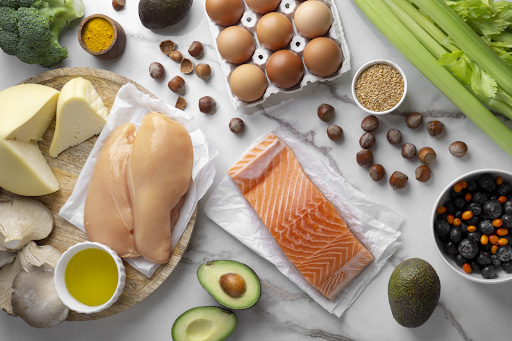What is protein?
Protein is an important macronutrient found throughout the body, including muscle, tissue, bones, eyes, skin and hair. Proteins are produced from building blocks called amino acids. There are 20 amino acids in our body, 9 of which we cannot make ourselves. Protein is involved in many important processes in the body, not just building muscle.
Protein functions
Protein helps maintain many important bodily functions, including :
- Proteins provide the structure of tissues such as bones, tendons, ligaments, cartilage, skin and muscle.
- Supports tissue repair and wound healing.
- Proteins make antibodies that protect us from infection.
- It is involved in the production of several hormones that carry messages around the body.
- Protein helps maintain fluid balance.
- Transport and store nutrients.

Why is protein important for weight loss?
There are three main reasons why protein is important for weight management.
- Adequate protein intake increases satiety, regulates appetite, and reduces overall energy intake.
- Protein helps maintain and increase lean body mass.
- Increased lean body mass increases energy expenditure. So the more muscle, the more energy the body uses throughout the day.
When you lose weight, you easily lose muscle along with excess fatty tissue. This is often a concern as a nutritionist if a member loses a lot of weight in a very short period of time. Consuming enough protein can help prevent this loss of muscle. Research has shown that High-protein diets have been shown to improve appetite control, fat loss, and maintenance of lean body mass or muscle mass compared to low-protein meal plans. It is recommended that you include protein in your diet every day.
What is a protein source?
Animal-based protein :
Seafood, meat, poultry, fish, eggs, and dairy products.
Plant-based protein :
Tofu, tempeh, seitan, beans, edamame, peas, lentils, chickpeas, nuts, seeds (pumpkin, flax, sunflower), quinoa.
If you’re on weight management medication, it can be difficult to get enough protein without feeling full.
How much protein do you need?
We recommend consuming at least 1-1.2 g of protein per kg of your current body weight. You can use this formula to calculate your protein requirements.
present weight in lbs divided by 2.2 = my current weight in kg
present weight in kg x 1.2 = target grams of protein per day
For example, if you weigh 90 kg, we recommend consuming 90-110 grams of total protein per day. This means consuming about 30-40 grams of protein at each meal. It’s important to remember to eat protein along with your snacks. Aim for about 10g of protein in each snack.
Remember that this number is only an estimate. Strict adherence to daily intake is not recommended. You don’t have to hit your protein goal exactly. You can definitely eat more. These numbers, along with hunger and appetite, should be used as a guide to drive when and where to include more lean protein in your diet.

If you would like more information about your specific protein needs and how to include more in your diet, please let our care team know you would like to make an appointment with one of our specialists. Visit Texas Specialty Clinic for safe and effective management of weight.
